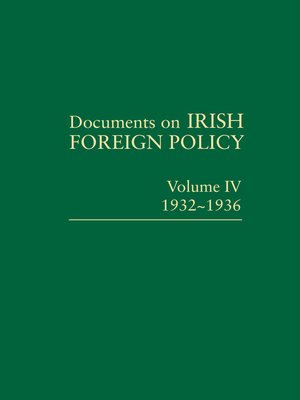
Sign up to save your library
With an OverDrive account, you can save your favorite libraries for at-a-glance information about availability. Find out more about OverDrive accounts.
Find this title in Libby, the library reading app by OverDrive.



Search for a digital library with this title
Title found at these libraries:
| Loading... |
Volume IV of Documents on Irish Foreign Policy covers an eventful period of Irish foreign policy, from 10 March 1932 to 31 December 1936. It saw the first Fianna Fáil administration led by a wilful Eamon de Valera, who was both President and Minister for External Affairs. The records show how de Valera and his officials set about restructuring the framework of British-Irish relations and dismantling the 1921 Treaty. Legislation facilitating the abolition of the Oath of Allegiance was introduced, land annuity payments due to Britain were withheld, and the office of Governor General was downgraded. A breakthrough in trade relations occurred when Britain imposed prohibitive tariffs following Ireland's retention of annuities, and Irish officials had to look abroad in search of alternative markets. De Valera expanded in size and influence of the Department of External Affairs, and politicians such as Joseph P. Walshe (Secretary of the DEA) and John W. Dulanty (Irish High Commissioner in London) were given unprecedented latitude in the tactical execution of policy. The volume reveals a personal dimension to Walshe's close professional relationship with de Valera. It offers a picture of Ireland in the 1930s enjoying unparalleled involvement on the wider international stage. Through the League of Nations diplomatic links with Europe and the USA strengthened and, on the eve of the Spanish Civil War, an Irish legation opened in Madrid. Documents charting the run up to the Second World War appear at the close of this exciting volume.






